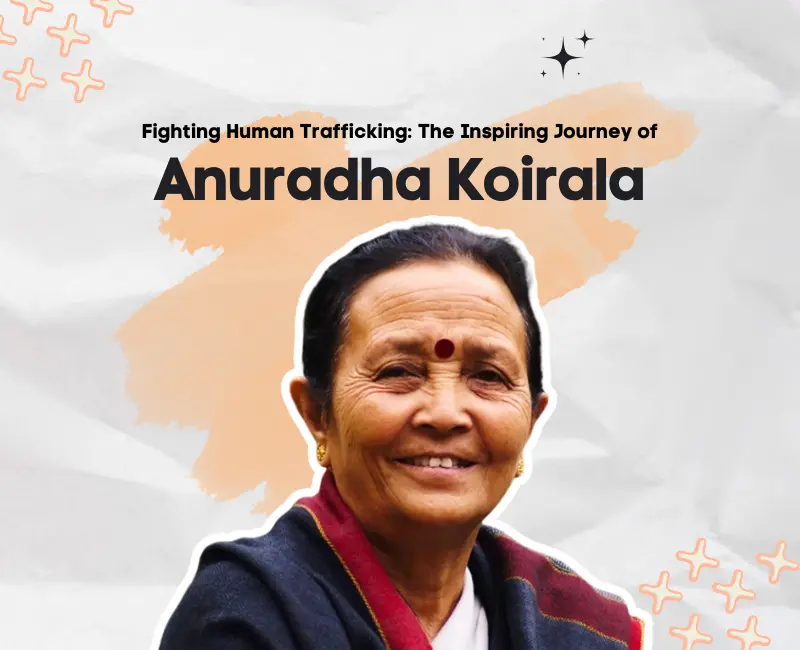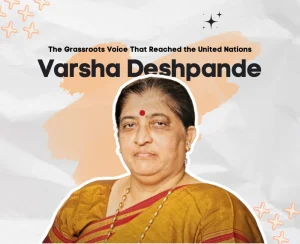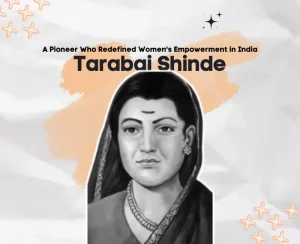Fighting Human Trafficking: The Inspiring Journey of Anuradha Koirala

When we talk about heroes, our minds often jump to soldiers, celebrities, athletes, or famous leaders. But sometimes, the most powerful ones are those ordinary people who rise up against extraordinary challenges. One such hero is Anuradha Koirala, a woman from Nepal who has dedicated her life to rescuing and rehabilitating victims of human trafficking.
There was a time when Nepal was facing the dark reality of trafficking, with countless women and children falling victim to false promises and exploitation. In that difficult time, Anuradha stepped forward with courage and compassion, determined to fight back.
What began as a small effort soon grew into a movement of hope and change, turning her into a symbol of strength not just in Nepal but across the world.
In this blog, we will share the inspiring journey of Anuradha Koirala from her early days to her fight against human trafficking, the creation of Maiti Nepal, and the challenges she faced.
Early Life: The Foundation of Compassion
Anuradha Koirala was born on 14 April 1949 in Nepal. Raised in a middle-class, educated family with strong values, she grew up surrounded by the teachings of kindness and service. She was the first child of Colonel Pratap Singh Gurung and Laxmi Devi Gurung. Her parents instilled discipline and empathy in her life.
As a child, she studied at St. Joseph Convent School in Kalimpong, India. It was here that she first felt an environment of love, care, and respect. The nuns became her role models, and their kindness inspired her to find her own purpose. Even as a child, she couldn’t bear to see suffering. She would often step forward to help friends or neighbors in need.
But destiny had something bigger in store for her. She witnessed the pain and suffering of women who were victims of domestic abuse and trafficking, and it moved something inside her. Instead of turning away, she decided to dedicate her life to protecting them.
From Teacher to Activist
Before she became the “Mother Teresa of Nepal,” Anuradha Koirala was a teacher. From an early age, she was drawn to teaching and helping others, which led her to become a school teacher. She taught English for 20 years in Kathmandu. Her students remember her as a strict yet affectionate teacher. She loved her job and the bond she shared with her students.
Teaching gave her joy, but deep inside, she knew she wanted to do something more, something that would bring change to the lives of those who had no one.
Her life took a drastic turn after an abusive marriage. She faced years of abuse from her husband and went through three miscarriages before her marriage ended. But instead of letting that chapter defeat her, she used her own struggles to connect with other women who were suffering silently. This is when her mission truly began. She decided to help women and children against violence and exploitation.
In the early 1990s, Anuradha Koirala often visited the Pashupatinath Temple in Kathmandu, where many women begged for survival. She began talking to them, encouraging them to stop begging and believe in their own strength. Most were survivors of violence, and Koirala offered support to help them start rebuilding their lives.
Anuradha’s journey as a social activist mainly began when she used her small teacher’s salary to help eight women who had faced domestic violence and were forced to beg to start their own small shops.
The Birth of Maiti Nepal
In 1993, with very little money, no government support, and just a few local supporters, Anuradha Koirala founded Maiti Nepal, an NGO. The word Maiti in Nepali means “mother’s home,” a place of love, care, and safety. For many women who had been trafficked, abused, psychologically unwell, or abandoned by their own families, Maiti Nepal became their first safe haven.
In the beginning, Anuradha used her own savings to help women and children. She rented a small house in Kathmandu and started taking in survivors. The main aim was to give a safe shelter to stay because, mostly, sex trafficking survivors are not accepted by their own families and friends.
Between 1993 and 2011, Anuradha made her mark as a social activist by rescuing over 12,000 girls from sex trafficking and, with her team, stopping more than 45,000 children from being taken across the Indo-Nepal border.
Maiti Nepal provides shelter and care through its rehabilitation home in Kathmandu, manages transit centers along the Indo-Nepal border, runs safe homes in villages, and also offers education through its own academy in the capital.
Maiti Nepal also helps reunite rescued women with their families, works alongside police to patrol the Indo-Nepal border, and collaborates with Indian authorities to free women trapped in brothels.
The network kept expanding, and soon UNICEF came forward with its support. With a team of 210 members, Anuradha launched awareness campaigns across villages most at risk of trafficking. Step by step, that small group grew into a strong organization making a nationwide impact.
Understanding Human Trafficking in Nepal
To understand the value and importance of her work, it’s crucial to know the level of the problem she was and is fighting.
At the time, Nepal’s open border with India made trafficking much easier. Every year, thousands of girls and young women from rural areas are lured with promises of jobs, marriage, or a better life. Many ended up in brothels in Indian cities or were forced into hard labor.
Some were as young as 12 or 13. Many were drugged, beaten, or threatened to stay silent. Once trapped, escape is almost impossible without outside help. This was the reality Anuradha Koirala chose to confront.
Sadly, this problem has not disappeared. Even today, many young girls from Nepal are tricked with false promises and trafficked across the border. The fight Anuradha began years ago is still just as important now.
Major Contributions of Maiti Nepal
Maiti Nepal works in many areas, from rescue and advocacy to education and prevention. What began as a single shelter has grown into a network of rehabilitation centers, transit homes, prevention homes, and hospices. At its core, the organization helps in:
Rescue Operations
Rescue is only the first step. Anuradha and her team work closely with police and border officials to stop trafficking in action. They keep watch for suspicious movements and intervene when they spot vulnerable girls. Her NGO also works with Indian authorities to free women from brothels, and helps them return to their families.
Rehabilitation
Survivors often face stigma, health issues, and deep emotional trauma. Maiti Nepal has shelters and transit homes where the survivors of exploitation, trafficking, and domestic abuse can stay safely. They receive counseling, medical treatment, as well as emotional support. The best thing is they can live as long as they become sufficient enough to live independently.
Education and Skill Building
To prevent survivors from falling back into vulnerable situations, Maiti Nepal focuses on education and skill-building. Girls are taught formal education and skills like tailoring, handicrafts, baking, and computer training. This breaks the cycle of vulnerability and exploitation and gives them a chance to lead normal lives.
Advocacy and Legal Support
Anuradha Koirala and other members of Maiti Nepal have been advocating for policy changes, legal reforms, and stronger law enforcement to combat human trafficking. Maiti Nepal also supports survivors in fighting legal cases against traffickers. Though the process is challenging, their efforts have led to many traffickers being convicted over the years.
Prevention
Maiti Nepal works to stop trafficking before it begins through community programs, workshops, and awareness campaigns. These efforts help individuals, families, and entire communities understand the risks, stay safe, and report suspected cases. They aim to prevent the occurrence of crime and protect the potential victims.
One Major Example:
Geeta – From Survivor to Peer Educator
Geeta was trafficked at age 9, sold into a brothel, and rescued at 14. She was brought to Maiti Nepal’s safe house, where her recovery began. Today, she works with Maiti Nepal as a peer educator, helping others through awareness programs and rehabilitation efforts.
Through these efforts, over 50,000 women and children have been rescued, rehabilitated, and reintegrated into society since the organization’s inception.
Expanded Mission
What began as a single shelter slowly turned into a nationwide movement with many branches of work. One of Maiti Nepal’s strongest defenses against trafficking is its network of transit homes near the border with India. These homes act like checkpoints of hope, where trained staff and even survivors themselves work side by side with police to spot traffickers. They stop vehicles, ask questions, and step in when they see a young girl in danger, often offering her the first real chance to escape. The organization’s courage does not stop at the border. Maiti Nepal teams, sometimes led by Anuradha herself, have entered dangerous brothels in India to rescue girls.
Challenges She Faced Along the Way
Anuradha Koirala’s journey has not been easy. She faced enormous challenges, both personal and professional.
- Threats from Traffickers: Her work directly attacked the livelihood of criminal networks. She received numerous threats from them, but she never gave up. She fought like a warrior queen.
- Financial Struggles: Running shelters, medical facilities, and rescue missions requires funds. In the early years, she often had no money and relied on small donations and personal savings only.
- Building Trust: Building trust and confidence in the women rescued from trafficking was never easy. Most had lost faith in everyone except their families, which made the healing process even harder.
- Social Stigma: Society often looked down on survivors. Even families most of the time refused to accept their daughters back, blaming them instead of the traffickers. This rejection made their life even more painful.
- Emotional Burden: Listening to stories of pain, abuse, assault, and betrayal every day can weigh heavily on anyone. Yet Anuradha has remained strong for the women who call her Didi.
Recognition and Awards
Over the years, Anuradha’s work has been recognized worldwide. Some of her most notable honors include:
1998: Best Social Worker of the Year (Nepal): Honored for her outstanding contribution to social service.
1999: Prabal Gorkha Dakshin Bahu Medal (Nepal): A prestigious national award recognizing her dedication.
2002: Trishaktipatta Award (Nepal): Another high national honor for her humanitarian work.
2006: Courage of Conscience Award (The Peace Abbey, Massachusetts, USA): Recognition for her courage in fighting trafficking.
2007: German UNIFEM Prize & Queen Sofia Silver Medal Award (Spain): International honors for her relentless advocacy for women’s rights.
2010: CNN Hero of the Year: A global recognition that brought her story to millions worldwide. The same year, the U.S. government awarded Maiti Nepal a two-year grant of $500,000 (over 52 million Nepali rupees) to strengthen its fight against trafficking.
2014: Mother Teresa Award (India): For her humanitarian service and protection of vulnerable women and children.
2014: Acharya Tulsi Kartitva Puraskar (ABTMM, India): Recognition from the Akhil Bhartiya Terapanth Mahila Mandal.
2017: Padma Shri (India): One of India’s highest civilian honors, presented by President Pranab Mukherjee. In the same year, she joined the Nepali Congress party.
2018: G.O.D. Award: Acknowledging her global impact and leadership in humanitarian service.
But for Anuradha, the greatest reward has always been seeing rescued girls smiling again, or watching them go to school, college, or the workplace.
Legacy and Continuing Work
Even today, in her seventies, Anuradha remains actively involved in Maiti Nepal. Though she has built a strong team to carry forward the mission, her presence continues to inspire every volunteer and survivor.
Her legacy is not just the thousands of women she has rescued but the awareness she has spread globally. She has given human trafficking a face and a voice, forcing governments, NGOs, and citizens to confront this crime more seriously. Her efforts protected thousands of young girls from being trapped in trafficking.
Maiti Nepal now runs 3 prevention homes, 2 hospices, 11 transit homes, and a formal school, supporting nearly 1,000 children every day.
Conclusion
Anuradha Koirala, also known as the Mother Teresa of Nepal, is an epitome of resilience, compassion, and unstoppable courage. She dedicated her whole life to saving and rebuilding the lives of human trafficking victims. She not only saves women and children but also advocates for their rights, provides legal support, and offers them shelter to live. Her NGO Maiti Nepal gives shelter, medical facilities, education, and skill-based training to survivors, giving them back their voice, dignity, and future. Her initiative of spreading awareness about human trafficking and how to save yourself and your children from it was a remarkable move. By 2025, she has saved over 50,000 victims and prosecuted and convicted more than 1,500 traffickers.


